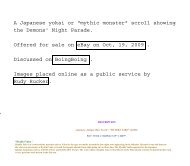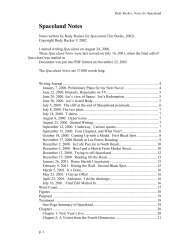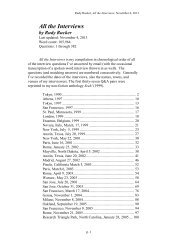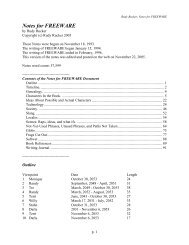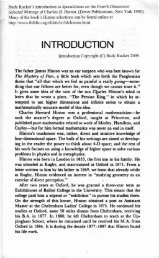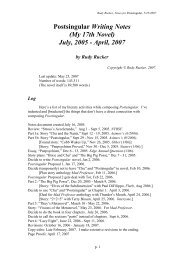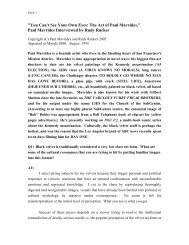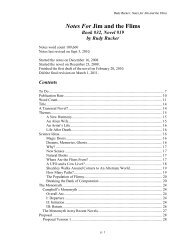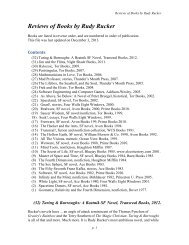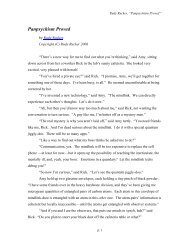Notes for the Lifebox, the Seashell, and the Soul - Rudy Rucker
Notes for the Lifebox, the Seashell, and the Soul - Rudy Rucker
Notes for the Lifebox, the Seashell, and the Soul - Rudy Rucker
You also want an ePaper? Increase the reach of your titles
YUMPU automatically turns print PDFs into web optimized ePapers that Google loves.
<strong>Notes</strong> <strong>for</strong> The <strong>Lifebox</strong>, <strong>the</strong> <strong>Seashell</strong>, <strong>and</strong> <strong>the</strong> <strong>Soul</strong>, by <strong>Rudy</strong> <strong>Rucker</strong><br />
years ago. I was in <strong>the</strong> math club, <strong>and</strong> our group got a tour of <strong>the</strong> computing center at <strong>the</strong><br />
University of Louisville.<br />
The thing that impressed me most on that first computer excursion was a large<br />
mechanical drawing device --- <strong>the</strong>y called it a plotter. The plotter was shaped like a s<strong>and</strong><br />
box; it was a square hollow frame four feet by four feet. In <strong>the</strong> middle of <strong>the</strong> plotter was a<br />
bracket-mounted pen held in place by tight pulleys. The pen was supposed to draw on a<br />
three-foot square of paper, but at <strong>the</strong> time of our visit <strong>the</strong> plotter was out of order --- nothing<br />
unusual <strong>for</strong> computer hardware <strong>the</strong>n or now.<br />
Even though <strong>the</strong> plotter wasn't working, <strong>the</strong> idea of it stayed with me. By speeding<br />
up <strong>and</strong> slowing down two little pulley motors according to some equations, a computer could<br />
move a pen around to draw pictures. Some of <strong>the</strong> pictures were on <strong>the</strong> walls. I seem to<br />
remember a spider-web <strong>and</strong> perhaps a mechanical drafting of a nut or a bolt. The friendly<br />
white-shirted nerds who ran <strong>the</strong> computer center tried to explain how <strong>the</strong>y used punch-cards<br />
to feed simple equations to <strong>the</strong> computer that ran <strong>the</strong> plotter — but <strong>the</strong>ir explanations didn't<br />
make any sense to me. The important thing was <strong>the</strong> visual evidence of <strong>the</strong> plotter: A<br />
computer could control a device capable of generating smooth shapes. Computers were more<br />
than punch-cards <strong>and</strong> teletype print-out.<br />
In math class at that time — I think this would have been <strong>the</strong> eleventh grade —— we<br />
were studying equations with things like cube roots, exponentials <strong>and</strong> polar coordinates. I<br />
wished I had a plotter to play with, so as to quickly turn lots <strong>and</strong> lots of equations into<br />
pictures. I also wished that I could underst<strong>and</strong> how to use punch-cards to put equations into a<br />
computer. I was hoping <strong>the</strong>re might be a way to learn this without having to become a<br />
complete Martian like <strong>the</strong> computer-center guys.<br />
Intro: Why I Hate Computers<br />
Computers are annoying. They require a huge amount of upkeep <strong>and</strong> <strong>the</strong>n don’t<br />
really work <strong>the</strong> way you want <strong>the</strong>m to; <strong>the</strong>y create endless make-work tasks; <strong>the</strong>y strain your<br />
body; <strong>the</strong>y allow strangers to invade your privacy. They buzz. They’re ugly.<br />
Working with computers isn’t quite like biting <strong>the</strong> head off a live chicken, but it’s<br />
close. The thing is, computers are somewhat repellent. The first thing that <strong>the</strong> first computer<br />
ENIAC did was to help design <strong>the</strong> hydrogen bomb. Computer cases are a dull, ugly shade of<br />
beige. Computers are <strong>the</strong> tools of telemarketers, dot-commers, oppressive governments, <strong>and</strong><br />
digital snoops. Many of us have office jobs where using a computer is part of <strong>the</strong> daily grind.<br />
The damn things never work like you expect <strong>the</strong>m to <strong>for</strong> more than a few weeks at a time.<br />
You have to constantly upgrade <strong>the</strong>ir software <strong>and</strong> hardware. Over-using a computer can<br />
damage your h<strong>and</strong>s, your arms <strong>and</strong> your back. They flicker <strong>and</strong> <strong>the</strong>y make an ugly noise.<br />
And so on.<br />
Intro Bio: What I Use Computers For<br />
For many of us <strong>the</strong>re’s a few “killer apps” that make our machines indispensable;<br />
<strong>the</strong>se might include email, word processing, web browsing, games, database management,<br />
spreadsheet manipulation, graphic design, 3D drafting or, <strong>for</strong> a few, writing computer<br />
programs.<br />
I often spend an hour in <strong>the</strong> morning on email, staying in touch with friends, family,<br />
students, <strong>and</strong> colleagues, also sometimes answering questions from <strong>the</strong> readers of my books.<br />
p. 43




